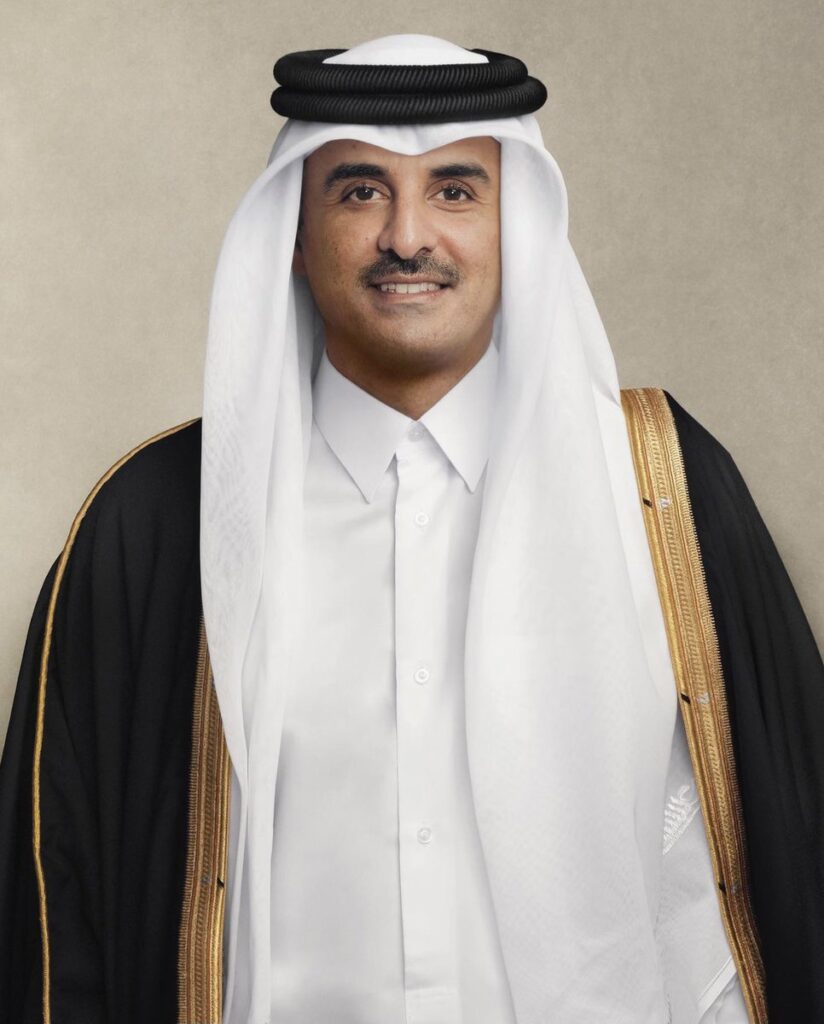Early Life and Education
Tamim bin Hamad Al Thani was born on June 3, 1980, in Doha, Qatar, to the ruling Al Thani family. As the fourth son of the former Emir, Hamad bin Khalifa Al Thani, Tamim’s upbringing was steeped in both privilege and the responsibility of eventual leadership. He was educated in Qatar and later at the prestigious Sandhurst Military Academy in the United Kingdom, a key experience that would shape his leadership style. Throughout his early life, Tamim was prepared for a future role in governance, learning both the complexities of global diplomacy and the intricacies of managing Qatar’s domestic affairs.

Path to Leadership
Tamim’s journey to the throne was not immediate. His father, Emir Hamad, who had taken power in a peaceful coup in 1995, gradually groomed him for leadership. In 2003, Tamim was appointed as the heir apparent and began to take on increasing responsibilities within the government, including overseeing defense and security matters. This period saw Tamim’s growing involvement in shaping Qatar’s foreign policy, especially in terms of strengthening ties with global powers and asserting Qatar’s influence in regional affairs. His ability to navigate complex international relations became apparent during this time. In 2013, his father, in a surprising move, abdicated the throne in favor of Tamim, transferring power smoothly and ensuring the continuation of the family’s rule.
Emir of Qatar: Domestic Reforms and Vision
Upon ascending to the throne in 2013, Emir Tamim bin Hamad Al Thani inherited a country already renowned for its vast oil and gas wealth, yet with the young leader came a fresh vision for Qatar’s future. Tamim wasted no time in initiating various reforms aimed at modernizing the economy, diversifying industries beyond oil and gas, and improving social welfare. Education, healthcare, and infrastructure projects received substantial investments under his leadership. Qatar’s focus on hosting high-profile international events, such as the 2022 FIFA World Cup, reflected Tamim’s broader ambition to put Qatar on the global stage as a beacon of modernity and progress. The young Emir also worked toward expanding the country’s international influence, strengthening Qatar’s role as a mediator in regional conflicts and a provider of aid to those in need.
Economic Diversification and Vision 2030
Tamim’s leadership has been marked by a strong focus on economic diversification, building on the foundations set by his father but taking them further with his Qatar National Vision 2030. This ambitious plan aims to reduce Qatar’s dependency on oil and gas revenues by promoting other sectors such as finance, education, technology, and tourism. Under Tamim’s guidance, the country has been investing heavily in infrastructure projects like the Doha Metro and the development of new cultural and entertainment hubs. His push for innovation is not only seen in large-scale projects but also in fostering a robust startup ecosystem and positioning Qatar as a hub for regional and global business. This diversification, coupled with a highly educated workforce, aims to secure Qatar’s future beyond the petroleum era.
Foreign Policy and Regional Influence
Tamim bin Hamad Al Thani’s tenure as Emir has been defined by Qatar’s assertive foreign policy. Building on his father’s policy of engaging with global powers while maintaining independence, Tamim has continued to strengthen Qatar’s international standing. One of the key elements of his foreign policy has been his efforts to balance relationships between traditional allies such as the United States, Europe, and new global players like China and Russia. Qatar’s diplomatic strategy has been characterized by hosting peace talks, providing humanitarian aid, and maintaining a neutral stance in conflicts where possible. His decision to keep relations strong with both Western and regional powers has allowed Qatar to punch above its weight on the global stage. Tamim’s leadership also saw the continuation of Qatar’s role as a key player in the Gulf Cooperation Council (GCC) and its involvement in resolving the regional tensions between Qatar and other GCC members, particularly Saudi Arabia and the United Arab Emirates, which culminated in a blockade from 2017 to 2021.
The 2017 Blockade and Resilience
One of the most significant challenges Tamim faced was the diplomatic crisis in 2017 when Saudi Arabia, the UAE, Bahrain, and Egypt imposed a blockade on Qatar, accusing it of supporting terrorism and having too close ties with Iran. Tamim’s response to the blockade showcased his resilience and leadership. Rather than yielding to external pressure, he consolidated internal support and worked to strengthen Qatar’s relations with non-Gulf countries, particularly Turkey and Iran, while also accelerating efforts to reduce Qatar’s reliance on imports, particularly food and medicine. The blockade ultimately reinforced Qatar’s determination to maintain its independence and pursue a foreign policy that reflected its interests, even in the face of adversity. Tamim’s diplomatic efforts during this period were critical in regaining Qatar’s position in regional and global affairs.
Human Rights and Social Reforms
Under Tamim’s leadership, Qatar has made strides in addressing social reforms, particularly in areas like labor rights, gender equality, and social welfare. Qatar’s rapid economic growth has provided the financial capacity to improve living standards, but the country has also faced international criticism, particularly concerning the treatment of migrant workers involved in infrastructure projects ahead of the 2022 World Cup. In response, Tamim’s government implemented significant labor reforms, such as abolishing the controversial kafala system and improving workers’ living conditions. Furthermore, Tamim has emphasized the importance of education and empowerment for women, with Qatari women increasingly participating in the workforce and taking leadership roles in various sectors.
Legacy and Vision for the Future
Tamim bin Hamad Al Thani’s leadership is still in its relatively early stages, but it is clear that he has set a course for Qatar that prioritizes modernization, economic diversification, and an enhanced global presence. His focus on sustainable development, social welfare, and international diplomacy has positioned Qatar as a more influential and progressive nation on the world stage. The Emir’s commitment to Qatar National Vision 2030 signals a forward-thinking approach to governance that seeks to secure Qatar’s place in the future while balancing traditional values with modern innovation. Tamim’s leadership has reshaped Qatar’s image, not only as a wealthy nation due to its natural resources but as a country eager to become a regional and global hub for diplomacy, commerce, and culture.
